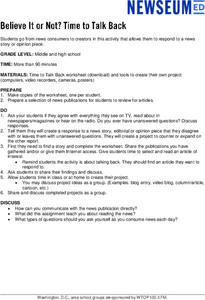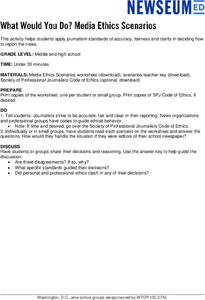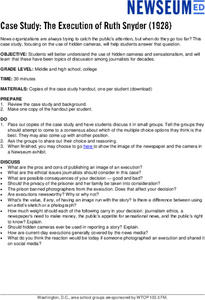Beyond Benign
Whose House Is It?
The rich and famous sure have interesting houses. The first installment of a 15-part series has scholars look at provided images of houses in an attempt to match them to their owners. They then generate of a list of features important to...
Newseum
Civil War: Encoding the News
Young journalists learn to appreciate the advantages of how modern media technology enables rapid news delivery as they compare today's media revolution to how the telegraph and Morse Code revolutionized news coverage during the Civil...
Newseum
Covering a Catastrophe: Press Conference Simulation
Young journalists have an opportunity to experience the challenges of covering a catastrophe by staging a mock press conference. Half the class acts as reporters while the others act as officials from the mayor's office.
Newseum
Photo Ethics: News Independence
Young journalists read a case study about an annual school tradition of a streaker running across the football field after the homecoming game. Small groups then decide whether or not to cover the story and whether or not to include a...
Newseum
News About My Community
After researching statistics about their community in local census reports, young journalists interview a resident about their interests and then analyze a local newspaper or homepage to see how similar the stories are to the residents'...
Newseum
Believe It or Not? Time to Talk Back
Young journalists select a news story, editorial, or opinion piece that they disagree with or one that leaves them with questions. They then create their report in response and share it with the class.
Newseum
Am I Being Fair?
Young journalists use four strategies from an "Am I Being Fair?" tip sheet to check for and counter personal biases about a topic. Scholars apply the strategies to an article about the best pizza as guided practice. Participants then...
Newseum
When Tragedy Hits — Role-Playing a Breaking News Story
Young journalists engage in a role-playing exercise that asks them to consider the journalism and ethical issues raised by the coverage of the mass shootings at Virginia Tech on April 16, 2007. Pupils play the role of either a reporter...
Newseum
Journalists Code of Ethics
Journalists are supposed to adhere to a Code of Ethics. To determine the degree to which reporters follow this code, individuals select three recent stories with photographs from newspapers, magazines, online news sites, or television...
Newseum
Reporting Part III: Staying Objective
The third and final lesson in the Reporting series tests young journalists' ability to be objective in reporting contentious topics. After brainstorming a list of contentious topics that interest them, the class selects one, and...
Newseum
Reporting Part II: Beyond the Basics
Scholars examine the articles written for the series' first lesson and select ones that would benefit from further research. In a 48-hour deadline, teams of three select one topic to investigate in greater depth and craft a revised...
Newseum
Reporting Part I: What Matters to Me
Young reporters have an opportunity to craft a news story about a topic that interests them. Class members brainstorm events and issues that affect them and possible sources of information. Individuals then select a topic, research it,...
Newseum
What Would You Do? Media Ethics Scenarios
Young journalists are presented with scenarios that involve media ethics. They must decide in each case whether to cover the story, what they would cover, and if covered, what the angle would be.
Newseum
Photo Ethics: What Is Newsworthy?
Do not try this at home! At school! Or any other place! Groups of young journalists discuss the ethics of publishing photos of school peers performing dangerous stunts. They share their decision with the class and explain their reasoning.
Newseum
Use ‘War of the Worlds’ to Teach Media Literacy
Orson Welles' 1938 radio broadcast of "War of the Worlds" is the focus of a lesson that looks at the importance of clarity in broadcasting. After listening to the radio broadcast, class members discuss the ethical obligations to...
Newseum
Case Study: The Execution of Ruth Snyder (1928)
The case of the 1928 execution of Ruth Snyder takes center stage in a lesson that asks young journalists to consider the ethics involved in publishing an image of an execution. A series of discussion questions ask individuals how they...
Newseum
Photo Ethics: Diversity
With the advent of photo manipulation software, it is possible to digitally edit a photograph in a way that is virtually undetectable. The question asked of young journalists in this lesson is whether such manipulation is ethical. Groups...
Newseum
Media Ethics: Fairness Formula Starts With Accuracy
As part of a study of media ethics, young journalists apply a fairness formula to news reports. They look at accuracy, balance, completeness, detachment, and ethics to determine if the reporting is fair.
Workforce Solutions
Networking Bingo
A game of Bingo gets scholars networking. Independently, participants complete the worksheet responding to each applicable prompt. With the group, peers roam the room to network in search of similar answers.
Workforce Solutions
Survivor Island
Decisions, decisions! Small groups decide on their dream career then enter a scenario that challenges them to make another big decision—if stranded on a deserted island, who would be saved or fed to the sharks. Because decisions are...
Workforce Solutions
Reality Check
Scholars complete the Reality Chech handout that identifies their potential salary given a specific profession. Pupils examine the lifestyle options and choose what they wish to have; however, each item costs money and, depending on how...
Workforce Solutions
Egg-streme Sports
Challenge small groups to build a structure that catches a raw egg without breaking—working collaboratively and applying mathematical and engineering principles. Pretending the frame was made by a business, scholars create a marketing...
Workforce Solutions
Discover Your Interests
Career exploration is the focus of a lesson that encourages pupils to choose a profession based on their strengths and interests. Following a thoughtful discussion covering different character traits, class members complete an interest...
Workforce Solutions
Simple Machine Scavenger Hunt
How are simple machines used in professional settings? To find out, scholars examine various pictures, cross-reference a list of simple machines, and write or verbally share how those items are used in specific jobs.

























